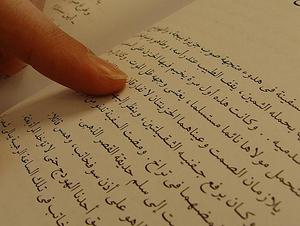Saudi literature pushing the envelope
CC: TMBA2003/Flickr
The following is not a full transcript; for full story, listen to audio.
When the steamy novel Girls of Riyadh came out a few years back, it made a big impression at home. The Saudi Arabian government in Riyadh banned the book. But Saudi readers still managed to snap it up, and so did others in the Middle East. Right now, Saudi Arabia’s capital is hosting an international book fair. It’s witness to what some are calling a tsunami of book reading and writing in the conservative kingdom.
In the past, this bookstore was hidden away on a remote street. Back then, it was called The Heritage Bookstore. Now, it’s on a main thoroughfare, and it’s been renamed, The Book Club. In other words, this underground bookstore is not so underground anymore.
"They know their customers, so it’s more like our little club. My favorite spot is in that corner, where you can find all the novels," says Ahmed al Omran, a Saudi blogger and writer. Ahmed says the place still gets raided every once in a while by religious police who deem some titles immoral. Technically, many of the older books on these shelves have been banned in Saudi Arabia.
And the new books would never pass the government censorship board in the first place, so they’re published outside the country in Beirut or Cairo, then shipped back in without a problem.
"It’s like the cool thing. The publishing houses, they know that Saudi sells," says Omran.
Ahmed displays stacks of new books by young Saudi writers — novels dealing with homosexuality or discrimination against religious minorities. This wave of writing and publishing was inspired in part by Girls of Riyadh. The novel broke Saudi taboos by talking about sex and family and faith, and it sold a lot of books.
"Literary-wise, it’s not great literature. But the good thing about it is that it created a lot of controversy and it encouraged a lot of people who would be reluctant to write a novel do it, you know?"
And growing numbers of Saudis are hungry to read these novels. Publishers in Beirut and Cairo say they sell more titles at the week-long book fair here than they do in a year in other Arab countries. So the problem now isn’t getting books published; it’s how to write better books. That was the subject of a recent lecture at King Saudi University.
Saudi author Yousef al Mohaimeed told students that breaking taboos is not enough. "So many new writers are concerned with fame or financial gain, they will write about any forbidden subject just to sell books. Reaching a higher level of novel writing will involve some hard work."
Mohaimeed is viewed as one of this country’s promising new writers. His novel, "Wolves of the Crescent Moon," recently was translated into English. After the lecture, student Sara Shubelli said she plans to follow Mohaimeed’s advice. She’s been working on a novel for the last two years. Shubelli says some of the new Saudi novels are pretty bad because Arab publishers are rushing them to press.
Shubelli and other students also complain that the university has no creative writing courses. They say they’re so desperate to learn how to write, they’ve resorted to watching YouTube tutorials on plot and setting. All this excitement for writing and publishing has another downside, says Saudi film director and screenwriter Hana al Omair. It’s prompted some of the country’s better, more established writers to hold back.
Omair says, "Because it’s actually now a trend – some are saying a tsunami of Saudi novelists – a lot who really work and understand what it takes for a novel to be written are actually not publishing their work at the moment. And they’re saying, “Let this fad finish. We don’t want to be counted as part of it.”
They would rather wait, she says, until the conversation is more about writing literature than it is about selling a book.
PRI’s "The World" is a one-hour, weekday radio news magazine offering a mix of news, features, interviews, and music from around the globe. "The World" is a co-production of the BBC World Service, PRI and WGBH Boston.
We want to hear your feedback so we can keep improving our website, theworld.org. Please fill out this quick survey and let us know your thoughts (your answers will be anonymous). Thanks for your time!
